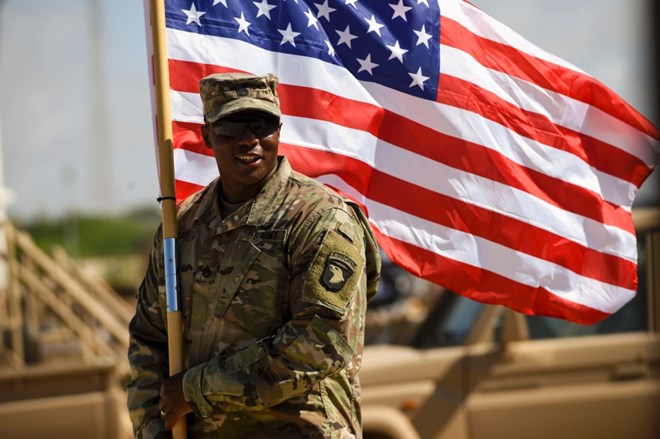
The first group of soldiers has completed a U.S. Army-led effort to train Somalia’s fledgling military in logistics, a stepping stone toward building a force that can sustain itself in a fight against Islamic militants.
The 101st Airborne Division dispatched a team of logisticians to Somalia’s capital of Mogadishu in April to begin working with a contingent of local soldiers on how to keep track of combat gear and maintain fleets vehicles needed to reinforce and resupply fighters in the field.
The attempt to professionalize forces in Somalia, an impoverished clan-based nation with no history of strong central government, is likely face challenges in the months ahead.
Much of the effort has focused on combat arms, but the U.S. has added mundane tasks like basic bookkeeping to its training portfolio.
“We definitely witnessed some development in their leadership,” said Capt. Seth Church of the 101st Airborne in a statement. “They were very curious, and we taught them some basic Microsoft Excel sheet methods of record keeping and watched as they began to implement some of our systems.”
The first class’ May 24 graduation was attended by Somalia’s prime minster and the U.S. ambassador to the country. Two more contingents of Somali soldiers will complete the course this year.
The focus on logistics comes as the U.S. intensifies efforts to aid the Somali military in its fight against the militant group al-Shabab. The U.S. has deployed special operations forces to advise local troops. A Navy SEAL was killed earlier this month while working alongside Somali soldiers.
The deployment of 40 troops from the 101st Airborne marks the first extended deployment of regular troops in the years since 1993’s tragic “Black Hawk Down,” incident that left 18 American soldiers dead. For about 20 years, the U.S. largely walked away from the country, conducting mainly secret operations. During the past three years, U.S. missions have begun to creep out of the shadows as the military slowly increases its small presence in Somalia.
The African Union’s mission in Somalia, which includes troops from several surrounding nations, has helped weaken al-Shabab over the years, pushing the group out of many former strongholds. But the union will begin withdrawing forces next year, and the mission coming to a close by 2020.
That has put pressure on the U.S. and other Somali backers to help hasten the defeat of Shabab while building a more capable local force.
U.S. Africa Command’s joint task force, based at Camp Lemonnier in Djibouti, coordinated the logistics training program, which took more than two years to develop and fund.
A Somali battalion commander said the training has helped troops learn how to formalize the management and movement of troops and equipment.
“For instance, how to operate a recovery vehicle, it’s a first time for many,” the commander, who was not named, was quoted as saying in a U.S. military statement. “How to operate, maintain and sustain water reserves, or fuel truck or maintenance truck, etc. It’s been very successful. A lot of this stuff has been missing, and we have filled that gap.”
SOURCE:STRIPES




















![New PM Starmer names first cabinet after landslide win British Prime Minister Keir Starmer looks on, at Number 10 Downing Street, following the results of the election, in London, UK, July 5, 2024 [Kevin Coombs/Reuters]](https://i0.wp.com/www.horndiplomat.com/wp-content/uploads/2024/07/2024-07-05T115520Z_52034812_RC2ZO8AP0G9J_RTRMADP_3_BRITAIN-ELECTION-1720202222.webp?resize=100%2C70&ssl=1)








